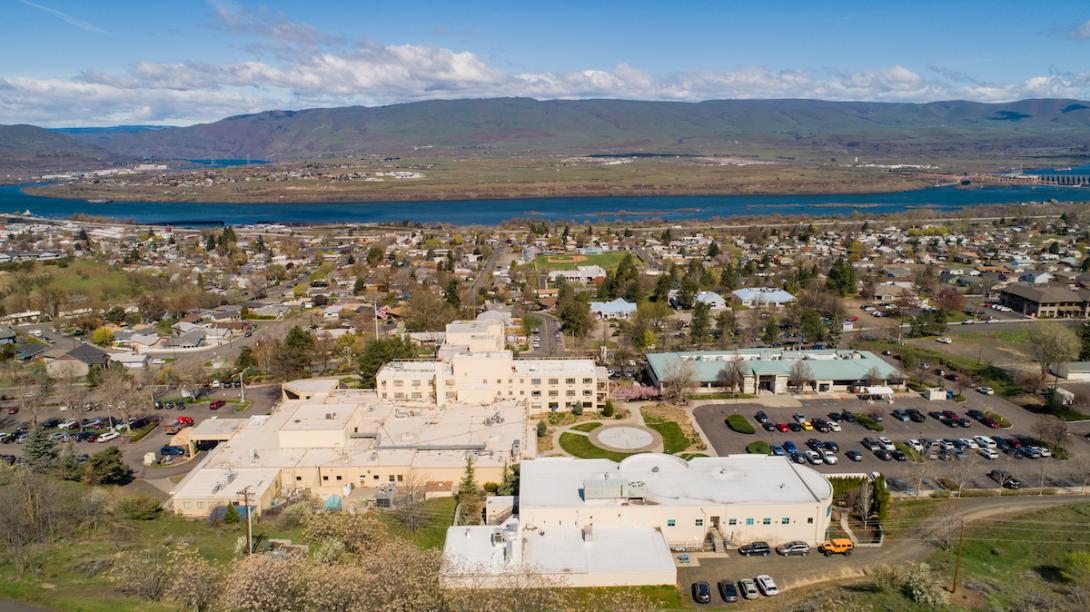
California-based Adventist Health will move ahead with absorbing financially strapped Mid-Columbia Medical Center in The Dalles, accepting a wide range of state-set conditions including terms for providing reproductive, gender-affirming and assisted suicide services.
The deal is the first hospital acquisition approved under Oregon’s year-old Health Care Market Oversight program, which aims to ensure purchases or acquisitions don’t lead to a cut in vital services. It also represents the first deal in which state officials moved explicitly to preserve reproductive services such as abortion, a focus for lawmakers who established the program.
The Oregon Health Authority issued its 11-page, April 13 order after an unusually long review period of nearly four months. Ordinarily, a basic review would take 30 days, but both sides agreed to extensions as the state asked for more information, researched Mid-Columbia’s operations and drafted the extensive conditions of the order. The order is the most prescriptive yet issued by the year-old market oversight program. It sets out in detail the medical services the hospital must make “commercially reasonable efforts to maintain” and the $100 million capital spending Adventist must carry out.
“Adventist Health has agreed to the conditions stated by the Oregon Health Authority, and we are excited about Mid-Columbia Medical Center’s choice to become part of our organization,” Adventist spokesperson Japhet de Oliveira told The Lund Report on Friday.
In its order, the Oregon Health Authority said the independent non-denominational nonprofit Mid-Columbia is under “severe financial distress,” and absent a rescue, “there is significant risk that (Mid-Columbia) may become insolvent.”
The 23-hospital nonprofit Adventist chain has also suffered recent operating losses but has substantial reserves to spend on expansion.
The Adventist/Mid-Columbia proposal drew criticism and praise from the public. Supporters said a deal will help the money-losing facility survive. The hospital said it needs extensive remodeling or a complete rebuild but is unable to raise or borrow enough for that work. Critics worried Adventist, which is affiliated with the Seventh Day Adventist Church, would impose Christianity-based restrictions on care. Of particular concern were the provision of abortions, gender-affirming care and assisted suicide under Oregon’s Death With Dignity law. The state review found Mid-Columbia currently provides only a low level of these services, if any at all.
The Service Employees International Union, which represents health care workers at numerous Oregon hospitals – but not Mid-Columbia – said it feared service restrictions by Adventist. It urged the state to carry out a major evaluation of the deal, including an outside expert review and a public hearing, rather than the extended basic review the state performed.
“We believe that any deal to acquire one of our remaining 16 independent hospitals should stand up to scrutiny by industry experts as well as affected community members, and are disappointed this transaction was not subject to a full review,” said Felisa Hagens, SEIU Local 49’s political director.
Still, the state spent considerable time evaluating the proposal. Its documentation includes an 85-page research report assessing Mid-Columbia and Adventist.
About 80 miles east of Portland, Mid-Columbia has struggled financially for years, typically hovering at or below the break-even point on operations. Soaring costs and erratic revenues during the pandemic worsened the situation, leading to an operating loss at the hospital of $9.8 million in 2022, on top of a $3.6 million operating loss in 2021, according to hospital filings with the state.
10-year obligation
The order specifies that under Adventist ownership, Mid-Columbia for 10 years must make “commercially reasonable efforts” to keep its current level of a variety of services, including general medical, maternity and surgical services; an emergency department; radiology services; an on-site pharmacy; obstetrics and gynecology; behavioral health and psychiatric services; and family medicine and primary care services.
The order outlines circumstances in which the hospital can apply to the health authority for an exemption from that requirement.
Also, citing public fears that Adventist might restrict pregnancy termination services, gender-affirming care and Death with Dignity Act services, the order requires Mid-Columbia to make “commercial reasonable efforts” to keep those services at current levels and discontinue them only if, for example, there is no longer a need for them, or other providers in the service territory are offering them.
A Mid-Columbia spokesperson declined to explain to The Lund Report the types of these services the hospital currently provides. However, the health authority report found that few of these services are currently provided at the hospital and most are instead provided at clinic settings separate from the hospital, although providers who also work at the hospital might perform them.
The state’s review found that Mid-Columbia in 2019-2021, “did not deliver any inpatient services where gender dysphoria was the primary diagnosis.” Gender dysphoria is distress or unease related to a mismatch between a person’s gender identity and sex assigned at birth. For 2018-2020, around 80 patients received care from specialty care from Mid-Columbia providers related to gender dysphoria, the report said.
“Most induced abortions are provided in clinic settings, rather than hospital settings, and (Mid-Columbia) facilities perform very few induced abortions,” the state report also said. “Fewer than 10 (abortions) were performed by (Mid-Columbia) providers in the 2018-2020 time period.”
As for legal assisted suicide, it is unclear whether Mid-Columbia or any of its providers have been involved in that service.
Adventist over 10 years would spend $100 million on Mid-Columbia, mostly on capital needs such as equipment and construction, according to the order.
Under the deal, Adventist would assume all of Mid-Columbia’s debts as well as its assets, which consist mainly of its buildings and an investment portfolio most recently valued at $19 million.
Despite running operating losses in recent months, Adventist is financially strong. It has a net worth – all assets minus all liabilities – of $2.5 billion, including an investment portfolio of $1.8 billion, according to its latest financial report. The system has been eager to use its wealth in order to expand.